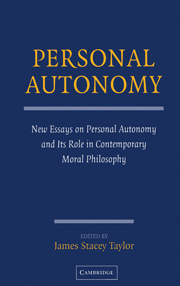Book contents
- Frontmatter
- Contents
- List of Contributors
- Acknowledgments
- Introduction
- PART I THEORETICAL APPROACHES TO PERSONAL AUTONOMY
- 1 Planning Agency, Autonomous Agency
- 2 Autonomy without Free Will
- 3 Autonomy and the Paradox of Self-Creation: Infinite Regresses, Finite Selves, and the Limits of Authenticity
- 4 Agnostic Autonomism Revisited
- 5 Feminist Intuitions and the Normative Substance of Autonomy
- 6 Autonomy and Personal Integration
- 7 Responsibility, Applied Ethics, and Complex Autonomy Theories
- PART II AUTONOMY, FREEDOM, AND MORAL RESPONSIBILITY
- PART III THE EXPANDING ROLE OF PERSONAL AUTONOMY
- Index
6 - Autonomy and Personal Integration
Published online by Cambridge University Press: 03 December 2009
- Frontmatter
- Contents
- List of Contributors
- Acknowledgments
- Introduction
- PART I THEORETICAL APPROACHES TO PERSONAL AUTONOMY
- 1 Planning Agency, Autonomous Agency
- 2 Autonomy without Free Will
- 3 Autonomy and the Paradox of Self-Creation: Infinite Regresses, Finite Selves, and the Limits of Authenticity
- 4 Agnostic Autonomism Revisited
- 5 Feminist Intuitions and the Normative Substance of Autonomy
- 6 Autonomy and Personal Integration
- 7 Responsibility, Applied Ethics, and Complex Autonomy Theories
- PART II AUTONOMY, FREEDOM, AND MORAL RESPONSIBILITY
- PART III THE EXPANDING ROLE OF PERSONAL AUTONOMY
- Index
Summary
One of the most intriguing aspects of the well-known exchange between Harry Frankfurt (1971) and Gary Watson (1975) concerning freedom of the will and the nature of the self is a shared insight, namely, that the autonomy of an action is decreased, perhaps even to the point of being nullified, by that action's springing from an attitude that conflicts with certain other elements of the agent's psychology. Is this so? And if it is, then what type of internal conflict is inimical to autonomy: conflict between levels of desire, as on Frankfurt's early view, or tension between Reason and Appetite, as on Watson's original account, or conflict of some other sort? Frankfurt in later work highlights a notion of wholeheartedness as a crucial agential good. The wholehearted agent is free of ambivalence, Frankfurt suggests, such that at least one of a pair of conflicting psychic elements is rejected “as an outlaw”; the element integrated into the self is the one with which the agent “identifies,” and action on a motivation with which one identifies is autonomous.
Much philosophical discussion has centered on the difficult notion of identification. Yet there is no consensus on either the nature of that phenomenon or its importance to understanding agency in general or autonomous agency, in particular. On one approach, identification consists of decision and action of a particular sort: Michael Bratman, for instance, understands identification as a matter of an agent's deciding to treat, and treating, a certain desire as reason-giving for action and practical deliberation, adding that the decision must be one with which the agent is “satisfied.”
- Type
- Chapter
- Information
- Personal AutonomyNew Essays on Personal Autonomy and its Role in Contemporary Moral Philosophy, pp. 143 - 161Publisher: Cambridge University PressPrint publication year: 2005
- 33
- Cited by

